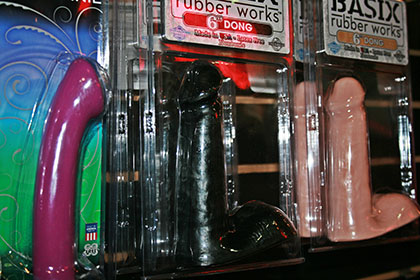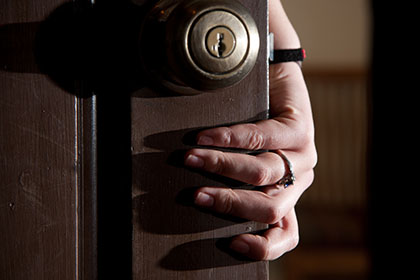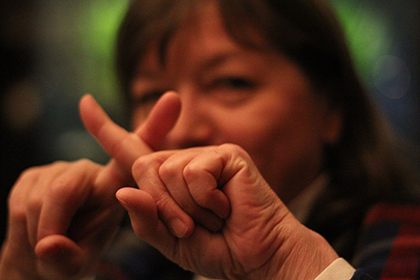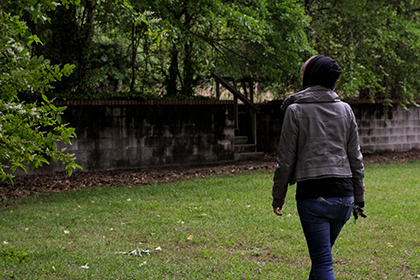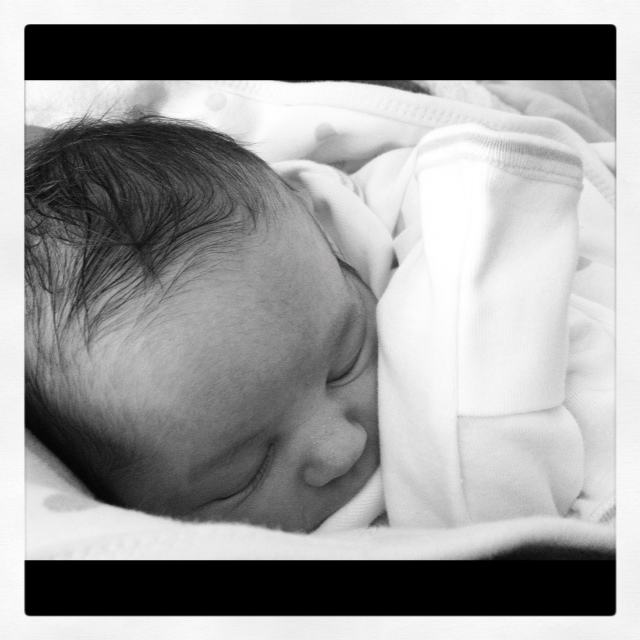UE Writer Emily Knight’s high school buddy Matthew has always marched to the beat of his own drum. An active participant in a polyamorous lifestyle and the Santa Cruz kink scene, Matthew was the perfect person to shed some light on a little-understood relationship lifestyle. Emily and Matthew sat down to work through some misconceptions, explore the benefits, and understand the details of the polyamorous relationship.
Emily: How about we start off with your individual experience. Describe your relationship life.
Matthew: Real or ideal?
Emily: Both, please!
Matthew: Ideally, eventually, I’d like to be in relationships with a group of like minded people working together for common goals. Right now, I’m living with one significant other. We’ve been living together since August and seeing one another for almost two years. During the course of that two years, I’ve had a few much smaller relationships—I went on a few dates, had a few kink experiences—but nothing you’d call a strong relationship or sexual intimacy.
Emily: And how about your S.O.? She is actively poly-amorous, too, right?
Matthew: Yeah, she definitely sees other people. When we got together, she was also seeing a guy with another primary partner, whom she still sees about once or twice a month, and recently she met another person who she sees as well. I’m actually pursuing one of the second guy’s other partners—she’s really cool.
Emily: Wow, that sounds complicated. Are most of the folks in your friends group non-monogamous?
Matthew: Yes, most close friends would identify as non-monogamous or polyamorous—not swingers!
Emily: Oh, really? What’s the deal with that term?
Matthew: There’s nothing wrong with it; it’s just a completely different thing than what we do. Non-monogamous can refer to anyone not in an exclusively two person relationship—including people who cheat on their partners, though that is obviously not us. Swinging, on the other hand, refers to married couples who get together with other married couples and “switch” for the evening. Polyamorous means lots of different things to lots of different people. For me, it means someone who has multiple loving, caring relationships. However, some define it differently. Some folks have one partner with whom they are “monogamous,” but they also have other partners for kink experiences or sex.
Emily: So they would say that these kink and sex experiences they have with others lack the love and care element of their monogamous relationship?
Matthew: Yes. It looks pretty much the same to me, as an outsider, but it’s not for me to define their relationships.
Emily: So is your variety of polyamory more common?
Matthew: Kind of. We look like a standard “couple” who do other things with other people… that makes us more easily accepted. Other polyamorous people often lack that hierarchy of one primary partner and other secondary partners. They try to equally share love and attention among all their partners.
Emily: How is that… calculated? Can you quantify love and attention?
Matthew: Everyone does it differently. And most don’t actually achieve this in reality. People you live with, people who excite you more, those people are going to get more of your attention—just like with friends. But lots of people do refuse to rank their partners. Then, you have polyamorous folks who use hierarchy. Some people refer to their primary or secondary partners—oh, and there are statistically significant others!
Emily: Ouch! What a clinical term!
Matthew: No, it’s actually really interesting. It’s the person you spend the most amount of time and energy on. So it could be a business partner, a roommate, anyone you’re with the most.
Emily: Where do you and your S.O. fit on this?
Matthew: She and I are a little different. We look like primary partners: we buy groceries together, we live together, go on dates, etc. But we don’t really like the idea of ranking. So we view her other relationships (and my future ones) as equally important, no matter how often she or I see them or how long they’ve known each other. It’s not fair to rank people’s emotions.
Emily: That all sounds counter-intuitive and kind of confusing, but I love what you said at the end. When you look at it that way, it makes a lot of sense.
Matthew: But it is important to talk about those emotions. If someone is getting all your Friday nights and the other is stuck with Tuesdays, you should bring it up.
Emily: It seems like there is a big potential for drama. How do you avoid that?
Matthew: I avoid everyone with a propensity for drama—even if I’m attracted to them, even if they’re interesting. If you stick around in the community, you can find out who is with whom and who has had practice in this type of relationship. By living like this, everyone’s communication skills are automatically going to improve. Everyone’s self-awareness and awareness of their own role in a given situation gets better. If you’re in the community for the right reasons, you’ll get better. People who aren’t will not improve and cause drama.
Emily: I know that in high school we would get into arguments and things and a lot of that would stem from poor communication between us. I don’t know about my own skills, but I’ve noticed that your communication abilities have gotten a lot better as we’ve grown up a bit. Do you think that comes from polyamory?
Matthew: Yes, and motivation. I work hard to build up my communication skills and look for relationships where we can work toward common goals. Most don’t see it this way, but… I know my own goals.
Emily: Well you’ve always been that way: very straight-forward and blunt, with clear directions.
Matthew: Still working on it! Seriously, though, I’ve had some really good experiences with people who are really good at communication. The Santa Cruz kink group I’m part of has some very good leaders. One in particular “gets off” at making people feel understood. Seeing how other people do the things that I want to do and do them well really helps. Being a part of the kink group and various other meet-ups, like Poly Pocket—
Emily: No way!
Matthew: Ha, yes, it’s a great name! Anyway, groups like this have social interactions at the heart of them. So we drink tea and eat cookies and just have great conversations. We have the really interesting conversations on feelings and they all took this same route:
Person: This made me feel ______.
Me: Why did you feel ____?
Then, of course, the person gets defensive, but then we have a really good conversation and I understand better where that person is coming from. People would get upset with me for not understanding the basics of emotions, so these conversations were a huge step for me to start understanding and using words for emotions and understanding the emotions of others better.
Emily: This kind of is starting to bring me to my biggest question about polyamory—jealousy. What role does that play in people’s relationships, and how do they navigate it?
Matthew: Some people don’t get jealous. My S.O. doesn’t at all. Other close friends don’t either. I am not one of them. It’s something to work on, like willpower. I’m analytical, so I look at it this way. I take apart the emotions: why am I feeling this way, how can I stop it? I was in a mono-poly relationship—
Emily: A what?
Matthew: I was monogamous to her, but she was polyamorous—not recommended. I was just hit with all these womps of jealousy—feeling left out, wanting what my partner had, wanting what my partner was giving, feeling not cared for… so those are the worst.
Emily: That’s how I’ve felt it in the past as well.
Matthew: Yeah, and that’s a very common way to feel jealousy. The other way would be anger-jealousy, but I have the “womps.” And I’ve been working on this for… six years. The entire time I’ve been polyamorous. So one thing I do is work to parse out why I’m feeling this way, for each situation. Another thing that’s really common is to take baby steps in a relationship. You set up rules for the relationship and slowly take them away. So I might say, okay, we can go on dates, but no kissing. Now we can kiss other people but no sex. Okay, we can have sex with other people, but no kink.
Emily: So setting up rules on what is allowed physically, that makes sense.
Matthew: Yeah, and there are emotional rules, too. Like call me after your dates, check in with me this often, etc. Or don’t tell me anything; I don’t want to know. This one is often less healthy, but it happens.
Emily: Do most polyamorous relationships have rules?
Matthew: Not always. The healthiest relationships may or may not have rules, but they have always have a groundwork of comfort and communication. So if my partner knows what will hurt me and she loves me, then she’ll just choose to express her polyamory in non-hurtful ways, and vice versa.
Emily: That makes it sound really… doable. It always sounded like something I would never be able to make work, because I knew I would be too jealous. But I love this idea of using rules and setting groundwork to avoid it.
Matthew: And the thing is, all relationships have “rules.” It’s just in polyamorous relationships, these rules are laid out, whereas in monogamous relationships, the rules are implied and everyone is just expected to know them.
Emily: Mind. Blown. That’s true!
Matthew: It all goes back to communication. If you lay out rules, it sets you on a much better playing field. My S.O. and I don’t have rules. We talked about it and we don’t like the idea for us. Instead, we trust each other’s judgment and focus on open communication for what we are comfortable with and what hurts us.
Emily: And that circles back to building up those communication skills to make all relationships better.
Matthew: Yes, definitely. Oh, and one more thing about rules—they are also for safety. So rules like wearing condoms can be important, health-wise. And rules like avoiding sketchy meet-ups. There are a lot of benefits and a lot you can cover with rules.
Emily: You mentioned an idea earlier that I want to get back to—people in poly for the wrong reasons. What would those be? Is the horny bro out of place here?
Matthew: Not necessarily! The right reasons would have to do with having lots of different experiences, wanting to meet cool new people and make new connections, or fulfilling different needs, etc. Wrong reasons would be like if someone is pressuring their partner into it because they want to be poly. You also see people get into it to try to save a relationship, and that rarely works. Some people do it because they have low self-esteem and they don’t think they’re good enough to have their loved one to themselves. You can almost always spot people in it for the wrong reasons, and they usually don’t stay.
Emily: Okay, I have one more major question for you—how did you get into the poly culture? Is it something you always wanted, or did you hear about it and want to try it out, or what?
Matthew: There are two reasons why people get into polyamorous relationships: 1) Monogamy never worked for them. 2) Monogamy never worked for them.
Emily: Ha!
Matthew: A lot of folks had bad monogamous relationships or somehow knew that they could never be happy with just one person. But I came to poly in a slightly different way. When I was about eleven years old, I looked at my parents and thought, if two people are this happy together, how happy would three people be? And why stop there? Wouldn’t four people be like sixteen times as happy?
Emily: So from your eleven-year-old musing, how did you get here?
Matthew: As a teen, I laid out some steps. Step One: Get comfy talking to girls. I’m still working on that one. No, I mean I still re-lay out my goals, but it’s less often. I probably did it last maybe two years ago. And the goals are always similar—level up my communication, level up meeting people.
Emily: Since your goal is a loving relationship community that works for common goals, are you actively searching?
Matthew: I am very passive as far as meeting people goes. So much is going on in my life. And you can’t force good connections. I go out to events, meet friends of friends. But when I find the right people, that’s just going to happen.
Emily Knight is a Baker/Teacher/Writer Extraordinaire! She is also overly fond of biking, dinosaurs, Trader Joes, YA fiction, and the city of San Jose. Watch her cook food and talk about books here: Lovin’ My Oven: A Blog of Cooking and Reading
Photo by Sara Slattery.
